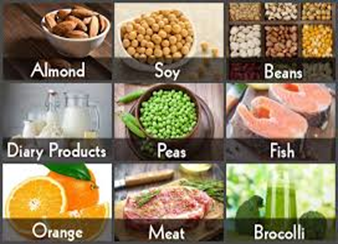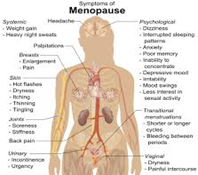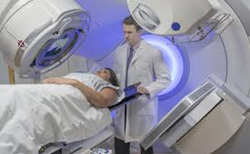
Menopause is a natural phenomenon that marks the end of a reproduction cycle of a woman. It is often diagnosed after a delay of 12 months of a menstrual cycle. Biologically, it occurs between 40 to 50 years of age but others may experience it earlier or later in life.

It comes about with irregularities which causes restlessness in her body. It can be hard to understand how menopause occurs unless one experiences some of the following symptoms:
i) Hot Flashes: – This is an abrupt feeling of heat where the blood vessel searches to cool off and widens near the skin surface which causes sweating.
ii) Irregular Periods: – A regular cycle is the one that goes in a consistent manner. If the cycle differs in a six-month span, it shows that it is irregular and often unpredictable.
iii) Mood changes: – It is also called mood swings. It is a sudden change of mood and it is a common disorder in the ageing women.
iv) Weight gain: – It is an experience in menopause caused by hormonal imbalance and low metabolic system.
v) Sleep problems: – Due to the hot flashes and irregular hormone setup, one experiences sleep disorders or insomnia.
More often than not, the causes of menopause may not be understood, but it is naturally caused by a decrease in production of estrogen and progesterone hormones by the ovaries causing insufficiency of normal production levels. It can also be caused by total removal of uterus and chemo and radiotherapy for cancer patients.

It has often put many women at risk of heart diseases caused by weight gain and high blood pressure, they become sexually inactive because of the low production of moisture hence vaginal dryness and low libido. It can cause a condition called Osteoporosis where the bones become weak and easily fractured. Urinary tract can be affected too due to elasticity of the urethra and vaginal tissues wearing off.
Women undergoing menopause are advised to do the following:-
i) Eat a lot of fruits and vegetables for they contain vitamins and minerals like vit A, C and E, magnesium, zinc etc.
ii) Try to maintain a healthy weight by doing a lot of exercises.
iii) Eat foods rich in calcium like milk, green vegetables, soya drinks. fish and nuts and vitamin D like Cereals, beef liver and egg yolks.
iv) Drink enough water to help blood veins circulate enough blood.






